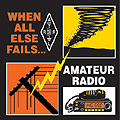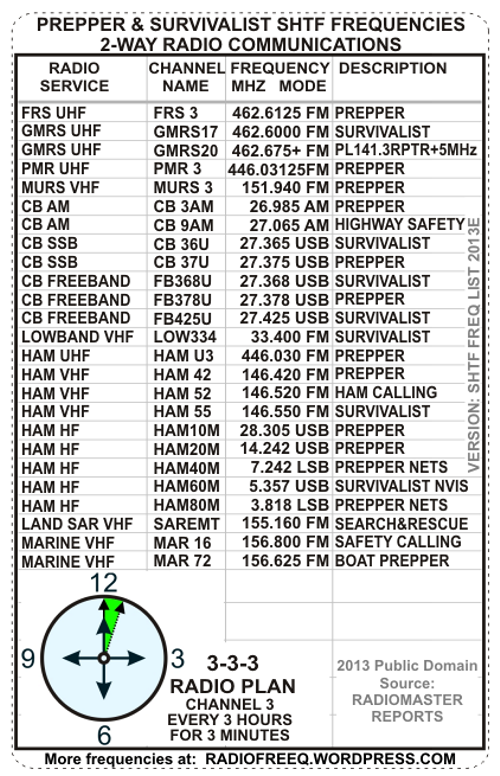 When All Else Fails or SHTF?
When All Else Fails or SHTF?
 A while back, Dan KB6NU noted the increasing number of preppers getting involved in ham radio. Preppers are people who are actively preparing for emergencies, natural disasters and disruption of social order. In our Technician license course, we’ve noticed an increase in the number of people identifying themselves as preppers.
A while back, Dan KB6NU noted the increasing number of preppers getting involved in ham radio. Preppers are people who are actively preparing for emergencies, natural disasters and disruption of social order. In our Technician license course, we’ve noticed an increase in the number of people identifying themselves as preppers.
Of course, amateur (ham) radio has a long history of emergency service and disaster preparedness. FCC Rules Part 97 says this is one of the purposes of the Amateur Radio Service: Recognition and enhancement of the value of the amateur service to the public as a voluntary noncommercial communication service, particularly with respect to providing emergency communications.
Historically, most radio amateurs approach the hobby from a technical or radio operating point of view, then find ways to apply it to emergency preparedness. The prepper tends to work the equation the other way…starting with the desire to have emergency communication capability and then working to get an amateur radio license.
Many prepper sites just give a quick overview of ham radio, positioning it with GMRS, FRS and CB radio. See Prepper Communications. Articles like this one give a more complete introduction to ham radio: The Skinny On Ham: Getting Licensed. This one, too: Every Prepper Should Be A Ham.
You may run into some creative acronyms on these prepper sites:
SHTF = ”Stuff” Hits The Fan
EOTW = End Of The World
TEOTWAWKI = The End Of The World As We Know It
YOYO – You’re On Your Own
There are web sites devoted to prepping with radio communications:
Prepared Ham
RadioSurvivalist.com
RadioMaster Reports
Many of these sites have useful information that may stretch your thinking on “being prepared.” Of course, some of these prepper sites (not the ones listed above) are a bit over the top and may have resulted from people going off their meds. Draw your own conclusions.
I’ve noticed a pattern of people creating prepper frequency lists, such as the one shown below. (Note that some of the ham frequencies listed do not conform to generally accepted band plans.) I can see the usefulness of having some assigned frequencies but its not clear to me how they’ll actually get used. I think the challenge for new prepper hams is to think through who they are going to communicate with and for what purpose. It’s also important to get familiar with the equipment and gain experience on the air, so when the EOTW happens you aren’t sitting there reading the radio manual.
Whether you think of emergency communications as “When All Else Fails” or when SHTF, amateur radio is a resilient communication tool.
73, Bob K0NR
Added 7 Dec 2013: I came across this video that does a good job of introducing ham radio to the prepper crowd: So you want a ham radio for emergency communications!














Thank you for adding the SHTF Frequency List and review to this site.
People come to this hobby for a million different reasons. I first got licensed many decades ago in my early teens because I found the technical aspects of amateur radio fascinating. Others get licensed because they have a friend or colleague who introduces them to the hobby. Or they attend a hamfest. Or they see hams working at public service events and want to do something to help their community. There are as many reasons as there are hams.
I welcome these folks because it gives us an opportunity to introduce them to other areas of our amazing hobby. The vast majority of so-called “preppers” just want to improve their personal preparedness. We might even learn something from their efforts. According to Ready.gov (http://www.ready.gov/sites/default/files/documents/files/checklist_1.pdf), you’re supposed to have at least three gallons of water per person on hand. I know that I have nowhere near that much. I have several spare battery packs for my HT, but am woefully unprepared to be self-sufficient for much more than a day or two. We all could be better prepared.
Look, Dave Coursey, N5FDL, summed up the bigger issue here:
http://n5fdl.com/davids-blog/2013/9/2/unlicensed-cheap-chinese-radios-can-cause-trouble.html
If they hold a valid amateur radio license, responsible people can use these radios on the ham bands (and possibly some public safety frequencies if the user is so authorized — and the equipment Part 90 certificated). Programming in the weather channels (receive only) is another good idea.
Sites publishing frequency lists should make it clear that these radios (and their operators) have no business using maritime channels, CB “freeband,” etc. For those who don’t want to go through the process of getting a ham license, properly certified MURS and FRS radios may be good choices.
I always thought that during a real emergency any person could use any frequency he or she had at hand. Notice I said REAL eergency.
Oh my God its King Kong and I am in Toyoko, can’t I use the 440Mhz handi talkie to call the army?
When someone’s life is in danger, any reasonable person will break any and all laws that might stand in the way of saving them. That said, planning to use frequencies without a proper licence in the case of an emergency is just plain bad planning. If someone is willing to get licensed **and** use their radio on a regular basis (i.e., engage in the hobby), then becoming licensed is a great idea for someone who wants to be “prepared.” If not, they would be better off with, say, a simple, battery powered AM/SW/FM radio for news and FRS/GMRS (or CB) radios for local use and/or NOAA weather. Much better to spend money on things you can make regular use of, regardless of circumstances.